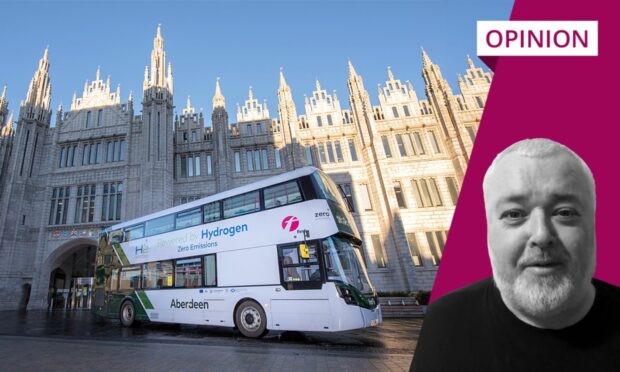They weren’t meant merely to be a way of getting around. They were to be a symbol of regeneration and renewal for a city facing serious challenges.
When hydrogen-powered buses first took to the streets of Aberdeen in 2021, they represented the city council’s commitment to dealing with a new reality where the oil and gas industry was no longer the bedrock of economic success.
Not only would these new clean, green buses be better for the environment, they would help establish the city at the centre of the UK’s hydrogen economy.
The optimism that surrounded the launch of the new bus fleet is long gone. The city council has been unable to fuel the vehicles for almost a year. Rather than carrying the people of Aberdeen from A to B, they’re sitting unused at First Bus’s King Street depot.
The Wrightbus vehicles, which cost an eye-watering £500,000 each, were bought as part of an £8.3million city council project, funded by the European Union and the Scottish Government. They were the first hydrogen-fuelled double decker buses to operate anywhere in the world.
Today, city council chiefs do not know when they will be able to get the buses back on the road.
Not only are council chiefs bracing themselves for a hydrogen scarcity expected to endure until autumn, there are concerns the city council’s much-vaunted hydrogen strategy has been abandoned.
The local authority’s inability to fuel the cutting-edge buses began last July, three months after gas company BOC handed over the keys to the Kittybrewster refuelling station.
The company had previously owned and operated the plant since 2015.
Serious questions need to be answered around Aberdeen’s hydrogen buses
There are serious questions to be answered about whether the council’s relationship with BOC is at the root of the current hydrogen shortage.
Labour councillor Deena Tissera has spoken of rumours the local authority and the gas company have effectively fallen out. City council co-leader, Christian Allard, has done little to reassure that’s not the case.
The SNP councillor’s remark that “as far as I know” the council and BOC have a good relationship is hardly inspiring.
The current failure of Aberdeen City Council to keep the hydrogen-powered bus fleet on the road calls for immediate action. Council tax-payers and businesses across the city have every right to demand these costly vehicles are put to their intended use.
Politicians of every hue seem unable to answer the question of what’s to be done with a problem like Aberdeen.
Little more than a decade ago, the SNP was promising Scots a bright and wealthy future based on a booming North Sea oil price. Since then, in their rush to be seen as pace-setters in the race towards net zero, political leaders at Holyrood have treated Aberdeen appallingly.
‘The situation is lusiscrous’
Nobody credible argues against the need to shift away from fossil fuels but the lack of a coherent – and achievable – strategy emanating from the Scottish Government has created huge uncertainty.
The recent announcement from the UK Government that the state-owned energy company is to be headquartered in Aberdeen was welcome, for sure but the benefits of this decision may not be felt for some time.
While we await more detail of that proposal, economic forecasts for Aberdeen are bleak, with the expectation it will underperform when compared with other UK cities.
Politicians under pressure often fall back on gimmicks and slogans. In the absence of a workable policy, they’ll announce a tax cut or offer voters a distracting freebie.
Much of the political decision-making around Aberdeen’s future seems born of such circumstances.
For political leaders confronting the reality of Aberdeen’s uncertain future, promises to turn the city into a pioneer of hydrogen power or to make it the home of GB Energy make sense. These are good stories.
But beyond the headlines these announcements generate, what good are they doing the city?
It is absolutely ludicrous that Aberdeen City Council is unable to power the fleet of hydrogen-fuelled buses on which so much money was spent.
That the council cannot do so suggests another case of a “good” idea being announced before political leaders had asked themselves whether it was also possible.
Aberdeen’s problems will not be solved overnight. It will take time, effort and ingenuity to rebuild what has been broken by the loss of North Sea jobs.
I’d feel a deal more confident about the city council’s ability to lead this regeneration if millions of pounds worth of hydrogen-fuelled buses weren’t currently gathering dust in a yard.
Euan McColm is a regular columnist for various Scottish newspapers



Conversation